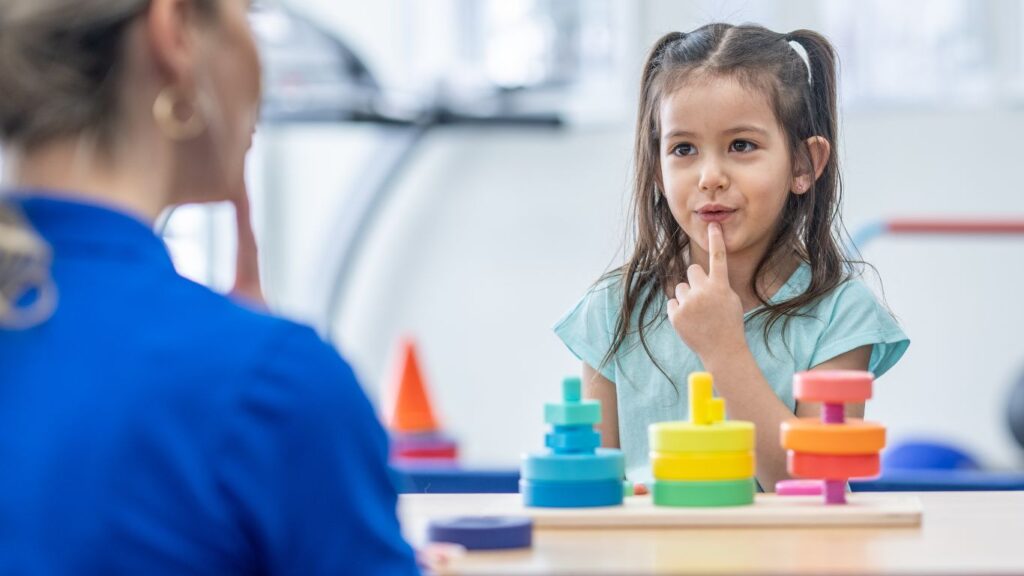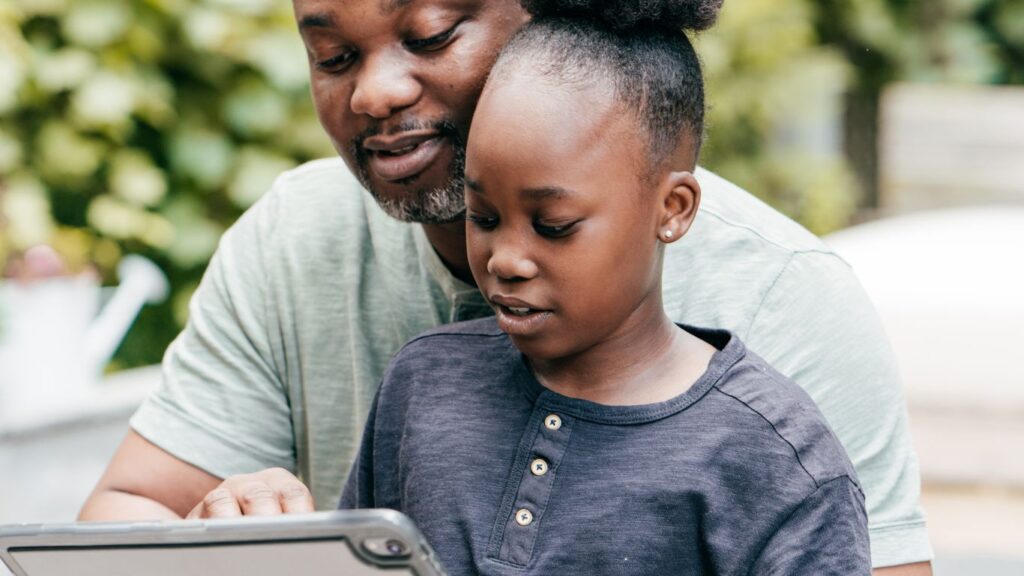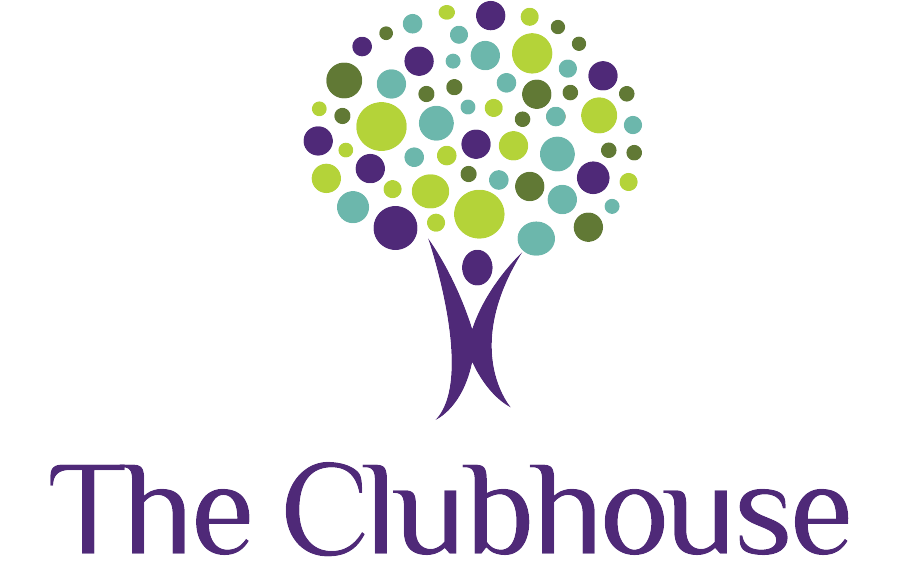Speech therapy helps children improve their ability to speak, understand language, and connect with others. It addresses challenges like pronouncing words clearly, developing language skills, or building confidence in social situations.
These difficulties can sometimes make it harder for kids to express their thoughts, make friends, or succeed in school. As a parent, you want to give your child the best possible support. Early intervention in communication challenges can make a big difference, providing the tools they need to thrive and feel confident.
This guide will walk you through How speech therapy improves communication skills, the benefits it offers, and how it can help your child communicate with ease and confidence.
At The Clubhouse, we understand that every child is unique. That’s why we provide personalized speech therapy sessions, designed by our team of professionals, to meet your child’s specific needs and ensure their best outcomes.
Get Started With ABA Therapy Today
Who Can Benefit From Speech Therapy?
From toddlers to adults, many individuals can benefit from speech therapy. These include:
Kids with Delayed Speech or Language Development
When children experience delays in speech or language development, it can feel overwhelming for parents. However, it’s not uncommon. Delayed speech or language development affects about 7% of preschoolers, according to the National Institute on Deafness and Other Communication Disorders.
But what exactly does this mean? In simple terms, delayed speech or language development occurs when a child isn’t reaching key communication milestones for their age.
For instance, by 12 months, most babies babble, make sounds, and respond to their names. By age 2, toddlers typically combine two-word phrases like “want toy” and have a vocabulary of around 50 words. If a child isn’t meeting these milestones, struggles to follow directions, communicate needs, or imitate sounds, it might be a sign of a delay.
That said, it’s important to remember that every child develops at their own pace. Some children are simply “late bloomers” and may catch up on their own.
If you’re concerned, don’t worry. Delays don’t mean your child won’t make progress.
The best step forward is to consult a pediatrician or a speech-language therapist. These professionals can evaluate your child’s development and provide targeted strategies to help them grow.
For many children, speech therapy becomes a game-changer. Therapy offers customized techniques to address specific challenges, and starting early often produces the best results.
Young brains are incredibly adaptable, and with the right support, children can build their communication skills, confidence, and stronger connections with others. Early intervention paves the way for incredible progress, helping your child thrive.
Adults Recovering from Strokes or Neurological Disorders
For adults recovering from a stroke or living with conditions like Parkinson’s, speaking and understanding language can become difficult. After a stroke, some people develop aphasia, which makes it challenging to talk, write, or even understand others.
Speech therapy can make a big difference. According to the Cochrane Library, practicing with a speech therapist over time can help them regain communication skills.
With exercises, role-playing, and tools like apps, patients can rebuild essential skills, stay connected to loved ones, and regain their independence. It’s not always easy, but every small improvement brings new hope and strength.
People with Autism, Apraxia, or Stuttering
People with autism, childhood apraxia of speech (CAS), or stuttering face unique challenges when it comes to communication. Speech therapy is personalized to their individual needs to make a real impact.
For kids with autism, therapy often focuses on improving both verbal and non-verbal communication, like gestures or facial expressions, while building their social skills. Research in The World Journal of Clinical Pediatrics shows that playful, routine-based therapy works well for improving communication in kids with autism.
That’s why we facilitate play therapy here at The Clubhouse. When kids are relaxed and having fun, they’re more open to learning. During play therapy sessions, our therapists create a safe environment that encourages children to communicate naturally and comfortably.
Get Started with Speech Therapy Today!
Key Techniques Used in Speech Therapy

Speech therapy can feel like a big step, but knowing the techniques makes it seem more approachable. Let’s explore some strategies therapists use to help kids find their voice and thrive.
Articulation Therapy: Exercises to Improve Sound Production
Articulation therapy helps children learn to make sounds clearly so their words are easier to understand. This technique focuses on exercises that train specific mouth movements, like shaping the lips or positioning the tongue just right, to form sounds correctly.
For example, a therapist might have a child practice saying the “s” sound repeatedly or guide them through games that teach proper pronunciation in a fun and interactive way.
Language Intervention: Techniques to Build Vocabulary and Sentence Structure
Language intervention targets the heart of communication. It centers on understanding and using words to share thoughts and feelings.
Therapists facilitate the expansion of a child’s vocabulary while teaching them how to string words into clear sentences. Activities often include picture books, storytelling, or creative games that expose kids to new words and grammar.
Studies show that early language intervention can boost language development dramatically, especially for children at risk of falling behind. By fostering your child’s vocabulary, you’ll watch them grow into more confident communicators.
Fluency Training: Strategies to Address Stuttering and Improve Speech Flow
For kids who stutter, fluency training focuses on teaching them how to control the rhythm of their speech. Therapists use techniques like slowing down speaking pace, practicing deep-breathing exercises, or breaking words into smaller parts to reduce stuttering.
It’s not about perfection. It focuses on helping your child communicate with less frustration. Plus, fluency training is most effective when started early and integrated into everyday life, such as during conversations at home
Social Skills Training: Role-Playing and Conversational Practice
Communication isn’t solely concerning words. It’s also about connecting with others. Social skills training helps children practice important social behaviors, such as initiating conversations, reading facial expressions, and responding in turn.
Therapists often use imaginary play or interactive games to make this training enjoyable and relatable. With practice, these skills can become second nature, paving the way for meaningful and happy relationships.
Benefits of Speech Therapy Beyond Communication

However, communication is simply the start. Speech therapy offers benefits that extend far beyond just speaking more fluently.
Improves Academic Performance
Speech and language skills are essential for school success, from reading and writing to joining class discussions. Speech therapy can help kids overcome challenges by improving how they process information, follow instructions, and express ideas.
Therapy can greatly improve academic performance for students with communication difficulties. Better communication also builds confidence and encourages a positive attitude toward learning.
Supports Emotional Development and Mental Well-Being
Communication is key to connecting with others. When it’s difficult, it can affect emotional health and well-being. For children with speech or language issues, building relationships can be hard, often leading to frustration, loneliness, or anxiety.
Speech therapy helps by improving their ability to express emotions and needs, creating stronger relationships and a sense of belonging.
Sets Children Up for Future Success
Good communication is key to success in all areas of life—making friends, building relationships, doing well in school, and starting a career. Speech therapy helps children overcome communication challenges early, giving them the tools they need to succeed at every stage of life.
It also builds important skills for their future in school, personal relationships, and work. By choosing speech therapy, parents give their children a strong foundation for essential life skills that will benefit them for years to come.
Parental and Caregiver Involvement

As parents, your role doesn’t stop at taking your child to speech therapy sessions. Your engagement is required in the progress of your child’s communication skills.
Here are some ways you can support and encourage your child’s speech development:
- Practice at home: Work with your child on the techniques used in therapy sessions, such as repeating words or practicing specific sounds.
- Create opportunities for conversation: Encourage your child to express themselves by asking open-ended questions, listening attentively, and responding positively.
- Play together: Playing with your child is an excellent way to improve their language and listening skills. It also provides valuable bonding time.
- Be patient: Remember that every child progresses differently and at their own pace. Celebrate even small improvements and offer support and encouragement throughout their journey.
Parental involvement plays a critical role in a child’s speech therapy progress. By working together with therapists, parents can ensure that their child receives consistent support and reinforcement, leading to more significant improvements in communication skills over time.
How to Get Started With Speech Therapy
Finding the right speech-language pathologist is a big step in your child’s speech therapy journey. Look for a licensed professional who has experience with kids and feels like a good fit for your family.
At The Clubhouse, our team of speech-language pathologists, ABA therapists, and occupational therapists collaborate to create a fun, supportive environment where kids thrive. Start by asking your pediatrician for recommendations or researching therapists online. Also, don’t be shy about asking questions about their qualifications and approach to make sure they match what you’re looking for.
The Cost of Speech Therapy
Understanding the cost of speech therapy and what your insurance covers is also important. Some insurance plans cover sessions, but it often depends on factors such as medical necessity or requiring a doctor’s referral. It’s always smart to check with your insurance provider to know exactly what’s covered so you can plan ahead.
Prepare For Your First Session
Before your first session, take some time to get ready for the initial consultation. This is when the therapist will get to know your child’s strengths, challenges, and communication needs.
Also, we encourage parents to share any medical or developmental history, along with their concerns. If you have school reports or evaluations, those can be helpful as well. Being prepared helps the therapist create a personalized plan to help your child reach their communication goals.
Get Started With ABA Therapy Today
Conclusion: The Transformative Power of Speech Therapy
Speech therapy can make a profound difference in a child’s ability to communicate and connect with the world around them. With the right support, patience, and tools, every child has the potential to thrive. Remember, progress takes time, and celebrating each step forward is an important part of the process.
If you’re ready to support your child on their speech therapy journey, we’re here to help. At The Clubhouse, our compassionate team is dedicated to partnering with you to tap into your child’s full potential. Contact us today to learn how we can work together to make a meaningful impact.

